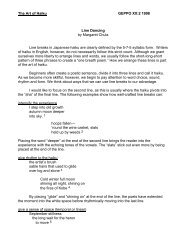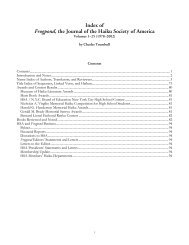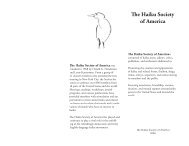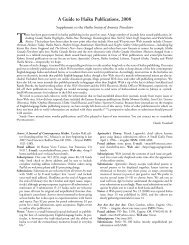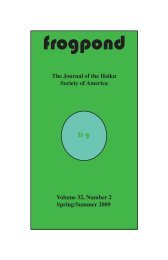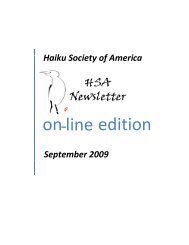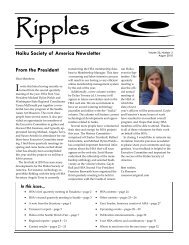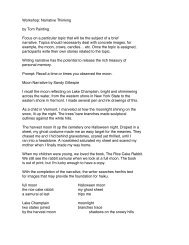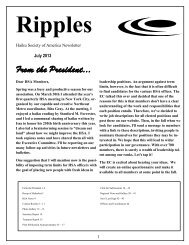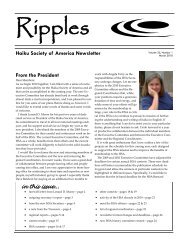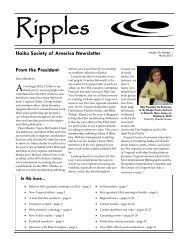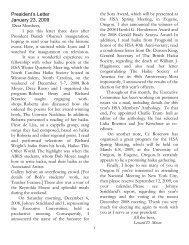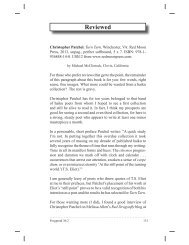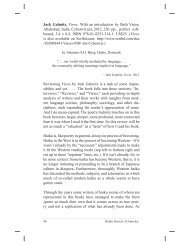Frogpond 34.3 • Autumn 2011 (pdf) - Haiku Society of America
Frogpond 34.3 • Autumn 2011 (pdf) - Haiku Society of America
Frogpond 34.3 • Autumn 2011 (pdf) - Haiku Society of America
You also want an ePaper? Increase the reach of your titles
YUMPU automatically turns print PDFs into web optimized ePapers that Google loves.
Do you feel that the current version is at least as much directed<br />
toward those who already write haiku as it is toward<br />
the initial audience?<br />
JANE: I was asked by the Branching Out program to give a<br />
talk for the general public—for people who might not have<br />
read much poetry, let alone haiku. I tried to do that—to find<br />
ways to open the field to newcomers—but poetry is a universal<br />
language, whose very point is that it does not simplify;<br />
it expands, saturates, investigates, faces many directions at<br />
once. I tried to make the original talk something that would be<br />
interesting to both kinds <strong>of</strong> audience—new, and informed—<br />
and truly, there isn’t that much <strong>of</strong> a gap. You’re always a beginner,<br />
entering a poem. A poem asks an original, unjaded<br />
presence, some state that includes both informed awareness<br />
and the erasure <strong>of</strong> preconception.<br />
I have polished the piece quite a lot since the original lecture,<br />
but that’s just what I do with anything I write, poetry or<br />
prose. I’d gone over it again just this past February, when I<br />
was asked to lecture on Bashō at a Japanese university. As to<br />
whether I changed it to make it more useful for serious writers<br />
<strong>of</strong> haiku, no, not specifically. I myself don’t make that strong<br />
a distinction between looking at poetry as a writer and as a<br />
reader. Every serious writer needs also to read alertly, with<br />
a real depth <strong>of</strong> attention—both her or his own work, and the<br />
work <strong>of</strong> others; and every act <strong>of</strong> reading a poem is a recreation<br />
<strong>of</strong> the original energies <strong>of</strong> its writing—that is what a poem is:<br />
not a record <strong>of</strong> thought, experience, emotion, realization, but<br />
a recipe for its own reenactment.<br />
CE: You have extensive knowledge about poetry in general<br />
and haiku in particular, including a knowledge <strong>of</strong> the history<br />
<strong>of</strong> haiku in English. Where do you see this book fitting<br />
in among some <strong>of</strong> the other work on haiku in English (for<br />
instance, Eric Amann’s The Wordless Poem; R. H. Blyth’s<br />
<strong>Haiku</strong> in 4 volumes; Harold G. Henderson’s <strong>Haiku</strong> in English;<br />
and William J. Higginson and Penny Harter’s The <strong>Haiku</strong><br />
Handbook to name just a few foundational texts in this field)?<br />
. . . . . . . . . . . . . . . . . . . . . . . . . . . . . . . . . . . . . . . . . . . . . . . . . . . . . . . . . . . .<br />
<strong>Frogpond</strong> 34:3 65



